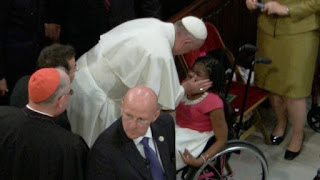The
original and prime purpose of Pope Francis’ visit to the United States was to
attend the World meeting of Families in Philadelphia. While the Pope has emphasized the importance
of the family throughout his trip, he was in full form last night.
Abandoning his prepared remarks, no
doubt to his translator’s chagrin, Pope Francis effusively spoke from the heart
about the central role of the family in transmitting God’s beauty, God’s truth
and God’s love. Smiling and gesturing
wildly as his pace quickened, the Pope spoke of parents who sustain the family
through hard work carried out through love; he spoke of children as the future
and strength of the family; and he spoke of grandparents as the family’s living
memory.
The
most poignant part of the Holy Father’s remarks, I think, was when he said that
“All of the love that God has in himself, all of the beauty that he has in
himself, he gives it to the family. And
the family is really family when it is able to open its arms and receive all
that love.” To emphasize his point, the
Pope asked, “And where did he send his Son – to a palace? To a city?
No. He sent him to a family. God
sent him amid a family. And he could do
this because it was a family that had a truly open heart.”
I
couldn’t help but think of my own family while Pope Francis spoke – my wife and
daughters, my parents, my brother and sisters, my grandparents, my aunts, uncles
and cousins. I am blessed with a large
family that has opened its arms to receive God’s love. May we all follow Pope Francis’ plea – “Let’s
protect the family, because it is in the family that our future is in play.”








